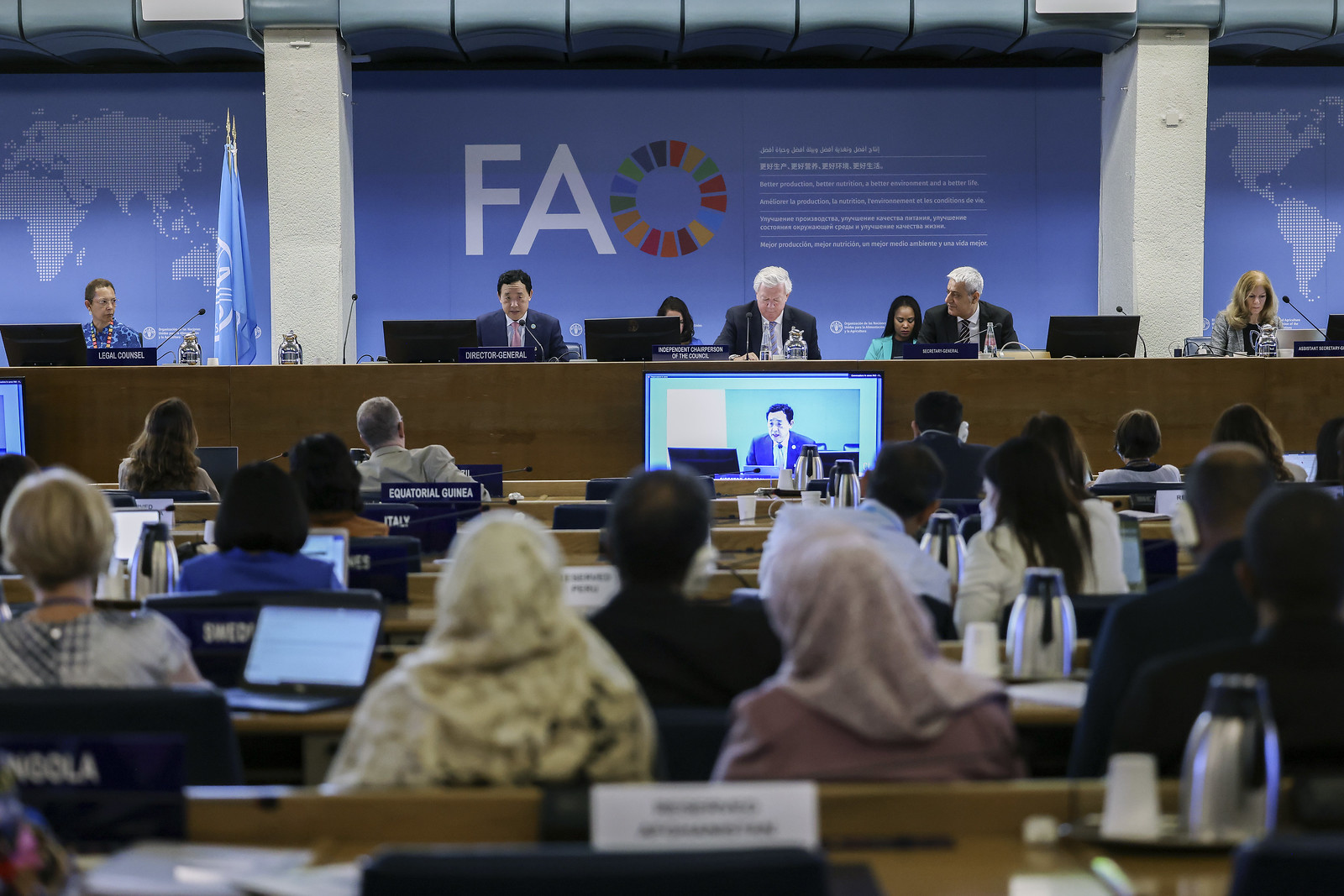FAO Council gathers to review plans and progress
Director-General hails “extraordinary” efforts made by Members, staff and partners as FAO readies for “next normal”

Opening of the 170th FAO Council.
©FAO/Alessia Pierdomenico
“We have been walking the talk,” he said in remarks opening the 170th Session of the FAO Council, being held in hybrid form in Rome this week.
He mentioned the series of successful Regional Conferences, held amid many logistical constraints due to ongoing lockdown measures, and noted that he had managed to make official visits to 16 countries, meet 13 heads of state or government and more than 130 ministers or vice ministers, as well as participate in person in important international fora such as the XV World Forestry Congress in Seoul, the International Conference on Digital Agriculture in Baku, and the 11th World Potato Congress in Dublin.
“This really helps us understand the situation and challenges faced by all five regions” and to intensify partnerships to support the FAO Strategic Framework and speed up the transformation of agrifood systems at national and regional levels, the Director-General added.
Qu also informed the Council on his participation in several G7 ministerial meetings during which he briefed the group on the new global food security scenario and the consequences of the war in Ukraine on food prices and supply chains. He also addressed the G20 Ministers of Finance and Central Bankers meeting, as well as the UN Security Council meeting on Food Security in May, affirming the crucial role of FAO and other Rome-based UN agencies in reversing rising levels of acute hunger.
The Director-General said he called for strengthening the humanitarian-development-peace nexus and identifying the root causes of food insecurity. “We are neighbours on this small planet village – what happens to one affects us all,” he added.
Qu stressed the importance of keeping the global agrifood trade system open, ensuring that agrifood exports are not restricted or taxed, and outlined the four major pathways for cooperative action: more investment in countries severely affected by the current increase in food prices: reduction of food loss and waste; better and more efficient use of natural resources, especially water and fertilizer; and a focus on technological and social innovations that can significantly reduce market failures in agriculture.
“If we don’t act within two years, we will have one billion people living in hunger,” said Hans Hoogeveen, Independent Chairperson of the FAO Council, introducing the session.
The FAO Council is the executive organ of the FAO Conference. The full speech of the Director-General’s opening remarks can be accessed here. Sessions of the 170th FAO Council can be followed by webcast.
Progress being made
Council Members are convoked to comment on and approve various budget reports. The Director-General also appealed to them to endorse two new thematic strategies, one on Climate Change and the other on Science and Innovation, both of which have been discussed at numerous informal consultations with Members at the regional and global level .
“Following this very inclusive process, it is now time to endorse the Strategies, and to allow countries to decide how best to implement them based on their national priorities and pathways,” Qu said, adding that Members have emphasized that the two strategies go hand in hand and should be implemented coherently and with their strong support, and emphasizing that he fully agreed with this approach.
The strategies will guide FAO in helping Members achieve their ambitions to address climate change in agrifood systems and the implementation of the Paris Agreement, and will benefit billions of small-scale producers who urgently need the best available science, technologies and innovation to play their part in transforming the world’s agrifood systems, he said.
The Director-General also updated Members on the successful implementation of various FAO flagship initiatives. The Hand-In-Hand Initiative now counts 52 participating countries, while the Green Cities Initiative has supported 61 countries since its launch in September 2020, with 19 projects in implementation or advanced design phase. FAO has started use of a pilot tool to accelerate the rollout of the 1000 Digital Villages Initiative and strengthen FAO’s e-agriculture strategy, is taking nominations to serve on the operating mechanism of the International Platform for Digital Food and Agriculture, and a wide group of stakeholders is participating in the newly-launched One Country One Priority Product Initiative. Other achievements include the dynamic approach taken through the FAO Strategy for Private Sector Engagement and a mentorship programme for women-led SME businesses in Africa.
Qu said his 34 months in office have been marked by “dynamics, humanity, family value, professionalism, innovation, inclusiveness, efficiency, effectiveness, solidarity and above all, the extraordinary efforts with extraordinary results of all FAO employees and of Members during pressing times” and urged continuing cooperation and strong partnerships as FAO moves towards a “next normal” phase in the wake of the global COVID-19 pandemic.
Contact
FAO News and Media (+39) 06 570 53625 [email protected]
Christopher Emsden FAO News and Media (Rome) (+39) 06 570 53291 [email protected]
